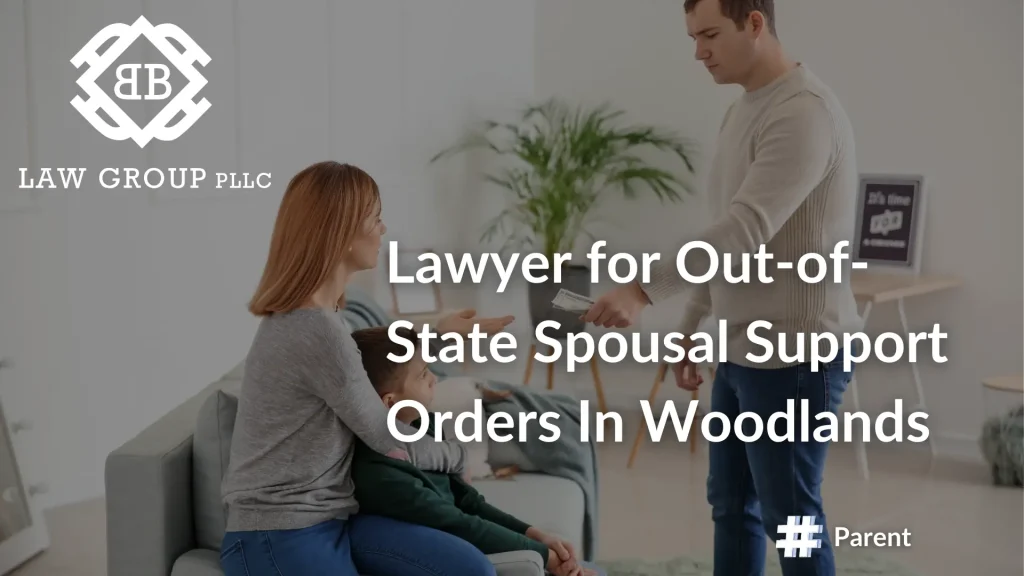If you have an order to receive spousal support or alimony from another state, or if your financial status has changed since you arrived in Texas, you may be wondering how it can be handled here. Cross-jurisdictional support orders are complicated, and you will need the services of an experienced attorney, such as the ones at BB Law Group PLLC to help you.
 When a court makes an order in a divorce case, the initial order falls under the laws and jurisdiction of whatever court it was made in. For instance, if the initial order came from Los Angeles, California, then any changes or modifications have to be made in a court in Los Angeles. In some cases, paperwork may need to be filed with the original court assigning jurisdiction to Texas.
When a court makes an order in a divorce case, the initial order falls under the laws and jurisdiction of whatever court it was made in. For instance, if the initial order came from Los Angeles, California, then any changes or modifications have to be made in a court in Los Angeles. In some cases, paperwork may need to be filed with the original court assigning jurisdiction to Texas.
However, the Full Faith and Credit Clause of the Constitution requires that all contracts and court orders validly entered into in one state must be honored in all other states. Therefore, a California order for support must be recognized in Texas. Any final judgment in your case will be honored by the Texas courts. How does that work for you, if you need to change or enforce an existing order that may be many years old?
The Woodlands attorneys for modifying, enforcing, or defending out-of-state-orders from BB Law Group PLLC can guide you through the entire process. We know the ins and outs of dealing with out-of-state orders and can be your advocates. Call us at (832) 534-2589 for a confidential consultation.
Modifying an Out-of-state Support Order
Whether you are the recipient or the provider of the support, most states, including Texas, only allow for modification of spousal support where the party requesting the modification can make a showing of a substantial change in circumstances since the last time the parties were in court. This could be a loss of a job, a promotion, or a sudden illness.
When modifying an out-of-state order, the first thing the attorney and the court will do is look at the issuing state’s requirements for modifying the order. That is the state’s laws that will control whether the order may be modified, and to what extent.
If the original order allows the support to be modified, then Texas courts will also modify the order. However, if the original jurisdiction’s order did not allow modification, or restricted it in any way, the Texas court will probably not alter the order.
Enforcing or Collecting an Out-of-State Order
Under the same full faith and credit requirements, Texas will enforce the collection of an out-of-state order, even if the type and amount of support ordered are greater than the amount that would be provided by a Texas court.
However, the method of collection can be difficult. In the 2018 case Dalton v. Dalton (551 S.W.3d 126), the Texas Supreme Court ruled that although Texas was required to accept an out-of-state judgment as final, it did not have to adopt that state’s collection systems. In the Dalton case, the wife was attempting to have her support order enforced via wage garnishment. Texas law does not allow wage garnishment except for “spousal maintenance” and the out-of-state order, in that case, did not qualify as such maintenance.
If you are attempting to enforce an out-of-state order on a former spouse, you should have an experienced attorney, such as the ones at BB Law Group PLLC, review the original order carefully to analyze the nature of the support order, and review it for potential hazards such as the one faced in Dalton.
Defending an Out-of-State Order
If you are in arrears on an out-of-state spousal support order, there may be a temptation to just “let it go.” This is a mistake. Every county in every state has an interstate support enforcement agency, and eventually, they will find you. The penalties for failing to pay court-ordered spousal support can be serious.
 Because the support order is an official court order, failure to pay without cause is grounds for a contempt charge. This is a criminal charge brought against you by the court, not by your spouse, and it is imposed because of your failure to abide by the court’s instructions.
Because the support order is an official court order, failure to pay without cause is grounds for a contempt charge. This is a criminal charge brought against you by the court, not by your spouse, and it is imposed because of your failure to abide by the court’s instructions.
Texas may also impose wage garnishment for spousal support arrears. Unlike the withholding of active support, Texas views arrearage as money owed, which the payor (you) should have set aside to pay the payee (your ex-spouse). Therefore, the courts will enforce collection via wage garnishment if necessary.
Wage garnishment in these cases must come from your disposable income and must allow you to pay for all necessities such as rent, food, medical care, and basic transportation. Garnishment will also not attach any unemployment benefits, and disability payments are usually exempt. The purpose of this is to ensure that the payor is not made a burden of the state by meeting their obligations.
If you live in Texas and have been served an order for support from a spouse residing in another state, then things have become complicated. For instance, you may still live in Texas, but your ex-spouse may have gone to Nevada to obtain a divorce. In that case, the question of whose laws will govern the support order, and which state’s modification and enforcement laws will apply, will require an extensive consultation with an attorney.
However, the attorneys at BB Law Group PLLC know that this happens frequently and will be there to protect your rights and assist you in ensuring that whatever order is obtained is fair to you.
How Can We Help?
If you have any issues with an out-of-state spousal support order, BB Law Group PLLC strongly recommends retaining an experienced attorney before taking any further action. Cross-jurisdictional legal matters are complicated and well beyond the scope of even the most knowledgeable pro se litigant.
Our attorneys will evaluate your existing order and your present needs and develop a legal argument to present to the court. Whether you need an existing order modified due to a change in circumstances or assistance collecting from a former spouse in another state, we will review the case and give you our best assessment.
Contact Us
Contact BB Law Group PLLC today at (832) 534-2589 so that we can begin our review of your case. Arranging legal matters between states can be time-consuming, so don’t delay. Contact our team today.
